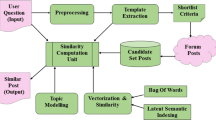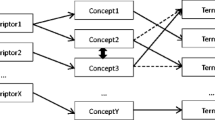Abstract
Automatic medical diagnosis and remedy finding is an active research area for decades. The increasing trend of finding health remedies through the internet emerged the necessity of research on the analysis of the patient-authored text. Focussed analysis of the patient-authored text can also help in automatic remedy finding. As the web contains a huge amount of medicine and diagnosis-related information, an intelligent system can extract the relevant information to provide a health remedy given a patient-authored text query. In this paper, we attempted to develop such a system. As the patients’ description of suffering plays a key role in homeopathy remedy finding, here we focussed on the homeopathy domain. As per the best of our knowledge, this is the first attempt in this domain. For the development, first, the patient-authored text is processed to identify the disease name and characteristic symptoms. Then a query is formed and a set of relevant web pages is retrieved. The retrieved pages are then processed in multiple levels to extract the medicine names. The appropriateness of the medicines is computed using a hybrid similarity scoring technique. The medicine having the highest similarity is suggested to the user. The system is tested using a set of real questions collected from various relevant websites. The evaluation results demonstrate that the system recommends a relevant remedy in 96.33% of cases.

Similar content being viewed by others
References
Miller RA (1994) Medical diagnostic decision support systems: past, present, and future. J Am Med Inform Assoc 1(1):8–27
Berlin A, Sorani M, Sim I (2006) A taxonomic description of computer-based clinical decision support systems. J Biomed Inform 39(6):656–667
Shortliffe EH, Buchanan BG (1975) A model of inexact reasoning in medicine. Math Biosci 23:351–379
Wright A, Chen ES, Maloney FL (2010) An automated technique for identifying associations between medications, laboratory results and problems. J Biomed Inform 43(6):891–901
Vanker AD, Van Stoecker W (1984) An expert diagnostic program for dermatology. Comput Biomed Res 17(3):241–247
Ordonez Carlos (2006) Association rule discovery with the train and test approach for heart disease prediction. IEEE Trans Inf Technol Biomed 10(2):334–343
Ely JW, Osheroff JA, Ebell M et al (1999) Analysis of questions asked by family doctors regarding patient care. BMJ 319(7206):358–361
Cimino JJ, Aguirre A, Johnson SB, Peng P (1993) Generic queries for meeting clinical information needs. Bull Med Libr Assoc 81(2):195–206
Yu H, Lee M, Kaufman D et al (2007) Development, implementation, and a cognitive evaluation of a definitional question answering system for physicians. J Biomed Inform 40(3):236–251
Cao YG, Liu F, Simpson P et al (2011) AskHERMES: An Online Question Answering System for Complex Clinical Questions. J Biomed Inform 44:277–288
Lally Adam et al (2007) WatsonPaths: Scenario-Based Question Answering and Inference over Unstructured Information. AI Magazine 38(2):59–76
Abacha Asma Ben, Zweigenbaum Pierre (2015) MEANS: A medical question-answering system combining NLP techniques and semantic Web technologies. Information Processing & Management 51(5):570–594
Mishra A, Jain SK (2016) A survey on question answering systems with classification. Journal of King Saud University - Computer and Information Sciences 28(3):345–361
Harkema H, Roberts I, Gaizauskas R, Hepple M (2005) Information extraction from clinical records. Proceedings of the 4th UK e-Science All Hands Meeting, 19–22
Sohn S, Clark C, Halgrim SR, Murphy SP, Jonnalagadda SR, Wagholikar KB et al (2013) Analysis of cross-institutional medication description patterns in clinical narratives. Biomedical 6(2013):7–16
Xu H, Stenner SP, Doan S, Johnson KB, Waitman LR, Denny JC (2010) MedEx: a medication information extraction system for clinical narratives. J Am Med Inform Assoc. 7(1):19–24
Savova GK, Masanz JJ, Ogren PV, Zheng J, Sohn S, Kipper-Schuler KC et al (2010) Mayo clinical Text Analysis and Knowledge Extraction System (cTAKES): architecture, component evaluation and applications. J. Am. Med. Inform. Assoc. 17(2010):507–513
Aronson AR, Lang F-M (2010) An overview of MetaMap: historical perspective and recent advances. J. Am. Med. Inform. Assoc. 17(2010):229–236
Stewart, Avaré, Smith, Matthew, Nejdl, Wolfgang (2011) A Transfer Approach to Detecting Disease Reporting Events in Blog Social Media. In Proceedings of the 22nd ACM Conference on Hypertext and Hypermedia, 271–280
Xu Jing, Gan Liang, Cheng Mian, Wu Quanyuan (2018) Unsupervised Medical Entity Recognition and Linking in Chinese Online Medical Text. Journal of Healthcare Engineering. Research Article (13 pages), Article ID 2548537, Volume 2018
Nie L, Wang M, Zhang L, Yan S, Zhang B, Chua T (2015) Disease Inference from Health-Related Questions via Sparse Deep Learning. IEEE Transactions on Knowledge and Data Engineering 27(8):2107–2119
Matsuda S, Aoki K, Tomizawa S, Sone M, Tanaka R, Kuriki H, Takahashi Y (2017) Analysis of Patient Narratives in Disease Blogs on the Internet: An Exploratory Study of Social Pharmacovigilance. JMIR public health and Surveillance 3(1):e10
MacLean DL, Heer J (2013) Identifying medical terms in patient-authored text: a crowdsourcing-based approach. J Am Med Inform Assoc 2013(20):1120–1127
Ranjan H, Agarwal S, Prakash A, Saha S K (2017) Automatic Labelling of Important Terms and Phrases from Medical Discussions. IEEE Conference on Information and Communication Technology 2017. IEEE Explore, https://doi.org/10.1109/INFOCOMTECH.2017.8340644
Gualtieri L, Akhtar FY (2013) Cancer Patient Blogs: How Patients, Clinicians, and Researchers Learn from Rich Narratives of Illness. Proceedings of the ITI 2013 35th Int. Conf. on Information Technology Interfaces, pp. 3–8
Kim S (2009) Content analysis of cancer blog posts. J Med Libr Assoc. 97(4):260–266
Bobicev V, Sokolova M, El Emam K, Matwin S (2013) Authorship Attribution in Health Forums. In Proceedings of the International Conference Recent Advances in Natural Language Processing (RANLP 2013), pp.74–82
Jensen K, Soguero-Ruiz C, Mikalsen KO, Lindsetmo R, Kouskoumvekaki I, Girolami M, Skrovseth SO, Augestad KM (2017) Analysis of free text in electronic health records for identification of cancer patient trajectories. Scientific Reports volume 7, Article number: 46226 (2017)
Martinez P, Martinez JL, Segura-Bedmar I, Moreno-Schneider J, Luna A, Revert R (2016) Turning user generated health-related content into actionable knowledge through text analytics services. Computers in Industry 78:43–56
Vydiswaran V, Mei Q, Hanauer DA, Zheng K (2014) Mining Consumer Health Vocabulary from Community-Generated Text. AMIA Annu Symp Proc. 2014:1150–1159
Chen Jinying, Druh Emily, Ramesh Balaji Polepalli, Houston Thomas K, Brandt Cynthia A, Zulman Donna M, Vimalananda Varsha G, Malkani Samir, Hong Yu (2018) A Natural Language Processing System That Links Medical Terms in Electronic Health Record Notes to Lay Definitions: System Development Using Physician Reviews. J Med Internet Res. 20(1):e26
Althoff T, Clark K, Leskovec J (2016) Large-scale Analysis of Counseling Conversations: An Application of Natural Language Processing to Mental Health. Trans Assoc Comput Linguist. 2016(4):463–476
Gkotsis G, Oellrich A, Velupillai S, Liakata M, Hubbard TJP, Dobson RJB, Dutta R (2017) Characterisation of mental health conditions in social media using Informed Deep Learning. Scientific Reports, Volume 7, Article number: 45141 (2017)
Rumshisky A, Ghassemi M, Naumann T, Szolovits P, Castro VM, McCoy TH, Perlis RH (2016) Predicting early psychiatric readmission with natural language processing of narrative discharge summaries. Translational Psychiatry volume 6, page e921
Mandy Jenny, Pais Vanessa, Cleetus Calvin (2015) Online Remedy Finder for Homeopathy. International Journal on Recent and Innovation Trends in Computing and Communication. 3(4):1781–1786
Vapnik VN (1995) The Nature of Statistical Learning Theory. Springer-Verlag, New York
Yang Y, Pedersen JO (1997) A Comparative Study on Feature Selection in Text Categorization, In: Proceedings of 14th International Conference on Machine Learning, pp. 412–420
Dogan Rezarta Islamaj, Leaman Robert, Zhiyong Lu (2014) NCBI disease corpus: A resource for disease name recognition and concept normalization. Journal of Biomedical Informatics 47:1–10
Srivastava SK, Singh SK, Suri J (2018) S. J Med Syst 42:97. https://doi.org/10.1007/s10916-018-0941-6
Chen X, Zhang Y, Zhao K, Hu Q, Xing C (2018) Domain Supervised Deep Learning Framework for Detecting Chinese Diabetes-Related Topics. In: Pei J., Manolopoulos Y., Sadiq S., Li J. (eds) Database Systems for Advanced Applications. DASFAA 2018. Lecture Notes in Computer Science, vol 10828
He B, Guan Y, Dai R (2018) (2018) Classifying medical relations in clinical text via convolutional neural networks. Artificial Intelligence in Medicine. https://doi.org/10.1016/j.artmed.2018.05.001
Silva J, Coheur L, Mendes AC, Wichert A (2011) From symbolic to sub-symbolic information in question classification. Artificial Intelligence Review 35(2):137–154
Kellerstein Joe (2007) The Value of a Characteristic Symptom. Unity in Diversity: Exploring Various Styles & Methods of Practice; Vol. 12, No.1
Lafferty J, McCallum A, Pereira FCN (2001) Conditional random fields: Probabilistic models for segmenting and labeling sequence data. Proceedings ICML 2001, MA, USA, pp. 282–289
Boericke William, Boericke Oscar E (1927) Homeopathic Materia Medica
Boericke Samuel Hahnemann (1992) translated by William (1992). Organon of medicine (6th ed., Hahnemann’s own written revision. ed. New Delhi: B. Jain Publishers. p. 211. ISBN 81-7021-085-2
ALLEN TF (April 2018) The Encyclopedia of Pure Materia Medica. [online] https://hpathy.com/e-books/encyclopedia-of-pure-materia-medica-by-tf-allen/. Accessed:
Cohen Jacob (1960) A coefficient of agreement for nominal scales. Educational and Psychological Measurement. 20(1):37–46
Author information
Authors and Affiliations
Corresponding author
Ethics declarations
Conflict of Interest:
The authors declare that they have no conflict of interest.
Funding:
The authors declare that they have received no funding for the current study.
Ethical Approval:
This article does not contain any studies with human participants or animals performed by any of the authors.
Informed consent:
Informed consent was obtained from all individual participants included in the study.
Rights and permissions
About this article
Cite this article
Priyadarshi, A., Saha, S.K. Web Information Extraction for Finding Remedy Based on a Patient-Authored Text: A Study on Homeopathy. Netw Model Anal Health Inform Bioinforma 9, 9 (2020). https://doi.org/10.1007/s13721-019-0216-2
Received:
Revised:
Accepted:
Published:
DOI: https://doi.org/10.1007/s13721-019-0216-2




